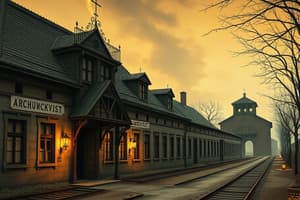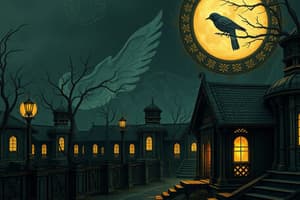Podcast
Questions and Answers
Why did Eliezer and his father lie to Dr. Mengele about their ages?
Why did Eliezer and his father lie to Dr. Mengele about their ages?
They gave an older and younger age, if you couldn't work because you were too young or old you were sent to be killed.
What is the Kaddish? What does Eliezer question about the recitation?
What is the Kaddish? What does Eliezer question about the recitation?
The Kaddish is an ancient Jewish prayer mostly done in a synagogue. Eliezer wonders how God could allow such suffering to happen to His people.
Why does Eliezer's father ask him, 'Do you remember Mrs. Schachter in the train?'?
Why does Eliezer's father ask him, 'Do you remember Mrs. Schachter in the train?'?
Because she mentioned the flames on the way to the first camp, and she was right about the fire.
What does Eliezer repeatedly say about the many terrible things that he has seen?
What does Eliezer repeatedly say about the many terrible things that he has seen?
Why does Eliezer compare their situation to a dream?
Why does Eliezer compare their situation to a dream?
What two choices did the German officer give after telling them they were in Auschwitz?
What two choices did the German officer give after telling them they were in Auschwitz?
When his father is beaten, why does Eliezer not react?
When his father is beaten, why does Eliezer not react?
What is ironic about the inscription on Auschwitz' iron gate?
What is ironic about the inscription on Auschwitz' iron gate?
Why does Eliezer lie to Stein about his family?
Why does Eliezer lie to Stein about his family?
Study Notes
Elie Wiesel's Night - Chapter 3 Study Notes
-
Eliezer and his father lie about their ages to Dr. Mengele to avoid being sent to death; an age deemed too young or too old meant instant execution.
-
The Kaddish is an ancient Jewish prayer, typically recited in synagogues, which Eliezer questions in light of the atrocities they are facing, struggling with the belief in a compassionate God amidst suffering.
-
Eliezer's father recalls Mrs. Schachter's earlier warnings about flames during the train journey as a haunting reminder of their grim reality in the camps.
-
Eliezer frequently repeats the phrase "Never shall I forget," emphasizing the indelible impact of the horrors he has witnessed.
-
He perceives their nightmarish experiences as dream-like, reflecting a sense of disbelief and an unwillingness to accept the grim reality of their situation.
-
Upon arriving in Auschwitz, the German officer presents two stark choices: work or face the crematorium, highlighting the brutal conditions faced by the inmates.
-
Eliezer's shock prevents him from reacting when his father is beaten, illustrating the numbing effects of trauma on individuals in extreme situations.
-
The inscription over Auschwitz' iron gate ironically reads "Arbeit Macht Frei" ("Work Sets You Free"), contrasting with the grim truth that death is a constant threat within the camp.
-
Eliezer lies to Stein about his family's safety to provide a semblance of hope, reflecting the desperate need for emotional support among the prisoners.
Studying That Suits You
Use AI to generate personalized quizzes and flashcards to suit your learning preferences.
Description
This flashcard quiz focuses on the critical themes and events from Chapter 3 of Elie Wiesel's 'Night'. It explores pivotal moments that reflect the struggles and questions faced by Eliezer and his father during their harrowing experiences. Test your knowledge on significant elements such as the Kaddish and the reasoning behind their deception to Dr. Mengele.




